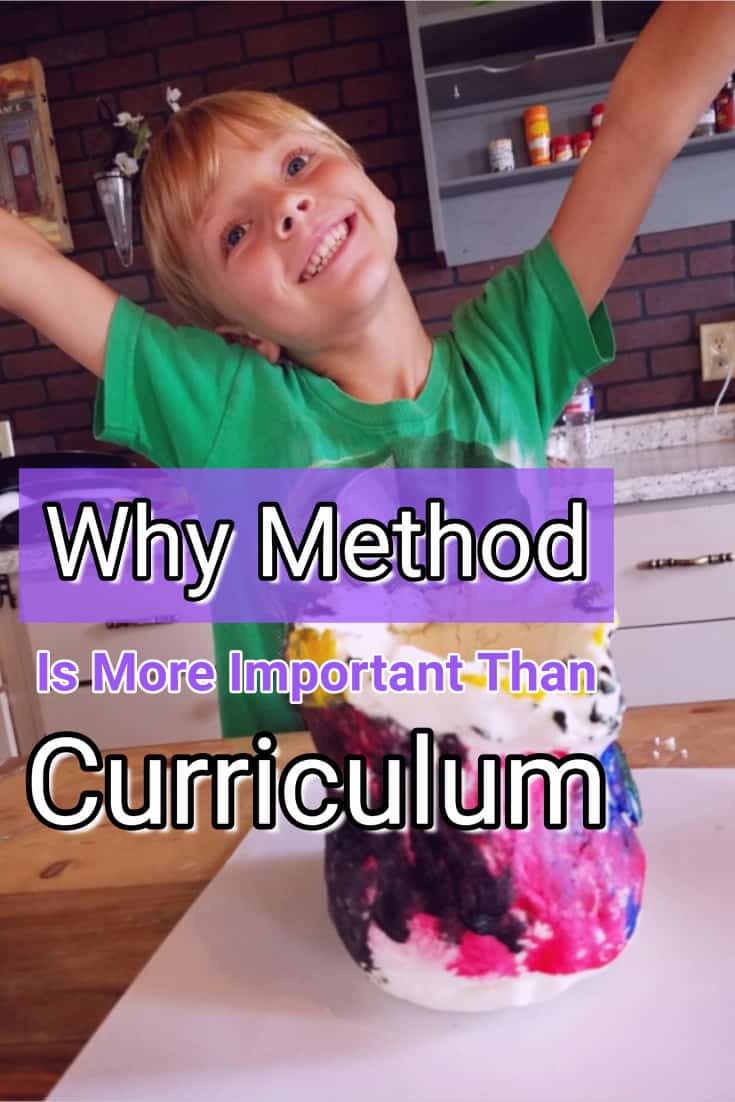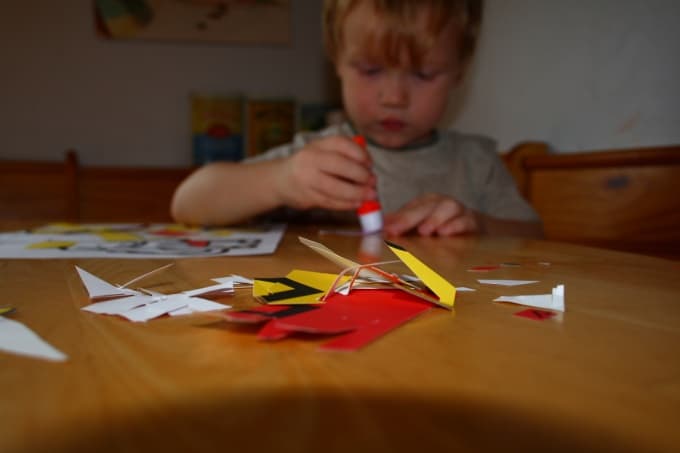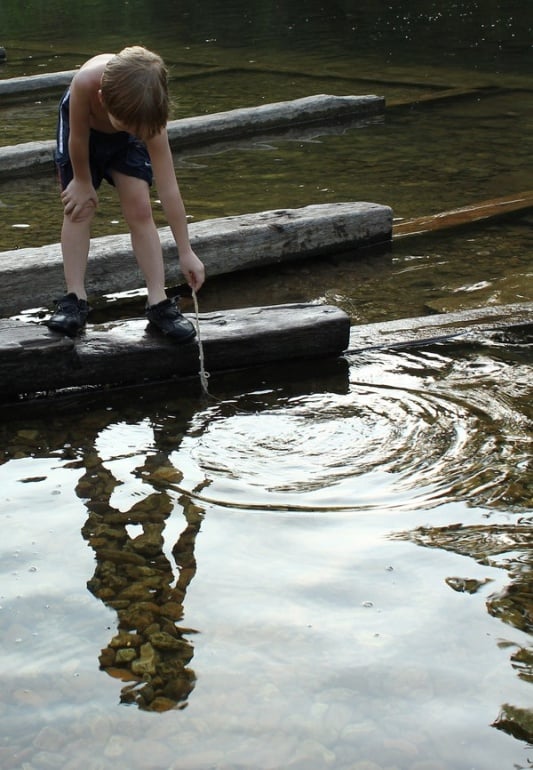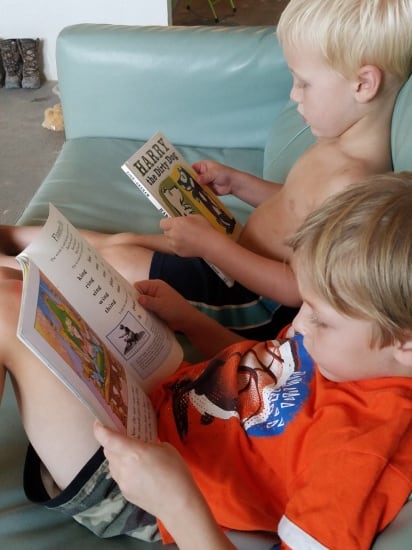Curriculum Isn’t as Important as Method

Two years ago, I knew things had to change. This was not the way homeschool was supposed to look. I’m not talking about outwardly, I mean the heart of it, and I knew it. I could just feel it. It all came about because of a simple comment made by my mom, a homeschool veteran herself.
When my sixth child was born, I knew that an easy, out-of-the-box curriculum was probably best that year. We were also moving and I knew there were going to be some tricky times. Still having a baby and a kindergartener, the following year, we were still using that same curriculum.
My mom had visited us during school hours and my son came in to ask a question about his work. She said, “Does he work alone? He’s so little. School should be mostly fun at this age.” We did some fun stuff, but not a lot. He mostly did the required pages with a little guidance.School should be mostly fun at this age.
I knew she was right. I had relied on that curriculum to get us through, but nothing more. I decided that if I was going to do this, I was going to do the absolute best. I began researching curriculums that had the values I was looking for.
I was looking for something that would bring my children’s education to life and allow them to be kids and have fun. That’s when I stumbled onto the Charlotte Mason method of education.
Educate with Method, Not Curriculum
I immediately stopped researching curriculum and instead spent the summer reading about the methods used to teach this curriculum. Wow! What an eye-opening summer! I discovered that 90% of educating our children should be method, not curriculum.
I had it backward. I always chose curriculum first.
The methods which we use to teach are what will educate our children, not the curriculum itself.
Method vs Curriculum
Method never comes from curriculum. You can’t look at a curriculum, say that you like it, and then decide on the method that your child will learn that curriculum. That’s like saying that you like salad and them deciding that makes you a vegetarian.
Method is the underlying basis of how and why we educate our children. What method you believe in should dictate what curriculum you choose.

That year of my mom’s comment, the how and why of our homeschooling was because I had to. All of my life, I had totally enjoyed homeschooling. I had always been an enthusiastic, hands-on teacher. My other children’s education had been fun. I had always felt led to stray from the curriculum and now, focusing on methods allowed me to understand why I wanted to do this.
Methods for Educating
So, what methods did I learn that summer?
1. Learning Happens Everywhere and at Any Time
The first and foremost was that learning happens everywhere and at any time. You have to watch for it and be ready to go with the moment. You have to set curriculum aside and jump into real life. Kids are great leaders here; just follow them.
2. Keep Lessons Short
I learned to keep our lessons short. For my younger son, this means only ten to fifteen minutes each lesson. His attention wanders if we go longer than that. My older son can do half hour lessons before he gets frustrated or starts to have trouble focusing. This also allows us to cover more variety of subjects like nature study and animal study and art.
3. Fully Utilize Nature Study
I learned that my kids love nature study. They love spending time outdoors exploring. They notice the smallest of things, like a tiny flower or bug. Then, we go research it and learn all about it. They even keep nature journals where they write about all of the things that they have seen in the great outdoors.

4. Grammar Can Be Taught Through Writing
I learned that grammar can be taught through writing. In fact, one of the best methods to teaching grammar is journaling and story writing.
Rather than following a strict curriculum, this allows them to learn a variety of things while enjoying themselves. I always require them to do the writing correctly, and we learn the rules as we go along. They love writing stories and then reading them to the whole class.
5. Children Love “Living Books”
I learned that children love books that tell stories; books that inspire them to be better people.
I choose our books carefully. They must come alive when you read them. They facts must be woven into the story so that the ‘heart’ of the story is where the focus is and not the facts. This includes ALL of our textbooks, even math, and spelling. These kinds of books are called living books.

6. “In Your Own Words”
I learned that the simplest way to assess if a child has learned something is to ask them to tell you what you just read, in their own words.
My boys LOVE this method. They fight for the coveted spot of first teller. After we read a lesson, instead of questions and answers, I let them tell me what was learned. Kids are natural narrators.
Applying This to Your Homeschool
That summer made all the difference in how I approached homeschooling. These were the methods that I found important to me. Maybe the methods that are important to you would be different.
Maybe you like a hands-on education or maybe a very self-taught method is important to you. Maybe you feel that homeschool should have very little “structured” time and lots of free learning time. The point is that your focus is on the method and not the curriculum.
You can decide what’s important to you and then choose a curriculum based on the methods that you feel are a must.
Whatever you decide, remember that a method of doing something is the way you go about it. This summer, try spending your time learning a method instead of choosing a curriculum. The rewards are immeasurable.







This just might be the truest curriculum article I've ever read. I think I might add that one's homeschooling method really does influence their stance on this issue. A "school-at-home" homeschool, an "online classes and video lecture homeschool," an "unschooling family," and a "classical family" might have some variances of opinion... or at least in their execution.
Saw this on Reddit and thought I would add it here because it was very powerful:
1) We are ALWAYS behavior modeling. Kids are not exclusively looking at the one thing we have in out heads that we desire to be in their heads, they look at the entire picture; full context. For example, tired, stressed, overworked, and lack of autonomy (you get the idea) demonstrates to kids that their lives are not their own to control; that happiness is a zero-sum game and that goodness is a product of misery. This is further reinforced by the fact that schooling is compulsory; there are people that know better than you. They don't just know better than you, they are better than you. You can expect this later in life as well from employers and politicians.
So on one side we imagine they may be learning arithmetic and grammar, but often without appreciation or purpose thus really just teaching them that sometimes there are things you simply must do that you don't want to (cue Marshall Rosenberg), which may be the only thing they remember once it is all over. In the extreme, I contend this is the environment where we learn racism and rape culture. Despite words to the contrary, the behavior of people around them model it; if you really want something, you need to take advantage of people and opportunities.
2) For everything you ever needed to know about textbooks, "Surely You're Joking, Mr. Feynmann" lays it out. It is a bureaucratic process where an (ironically) uneducated board decides the best interests of everyone in the face of marketing people from publishing companies telling them what to do. No wonder what you are left with is books that took what should have been a very interesting subject, chewed it up, and vomited it onto some paper.
The article advocates living books for history. I would add that mathematics is far more interesting a subject when you go back and add in the people and the story that brought us the mathematics we have today. Math can seem less intimidating when the student is reminded that every little piece or idea in some respect was the result of lifetimes of work from people before us, what a blessing that we are able to peek at their contributions to humanity. Compare that to "You need to learn algebra because you will be tested on it later". What?!? Just no.